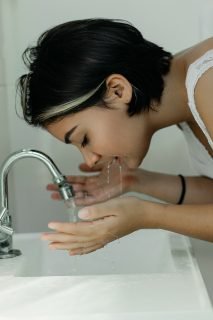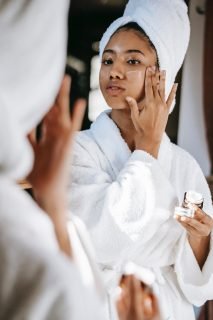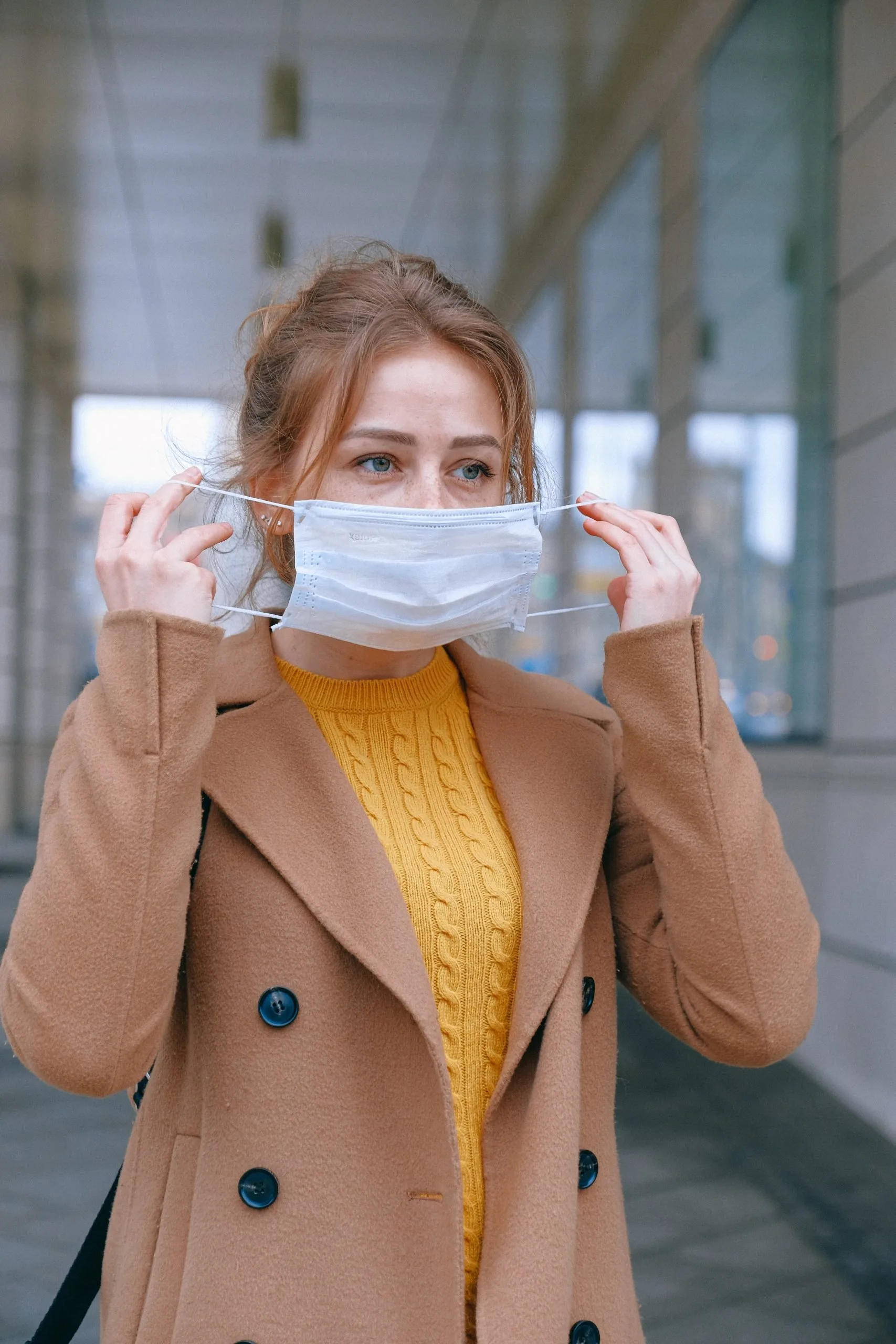One of the most visible things to come out of Covid-19, and there have been many, is maskne. Maskne is a term that was coined as a result of the widespread wearing of face masks as a prevention technique against Covid-19. Having trouble with your skin is never fun and often requires treatment of some sort. But what do you do when the source of your problems (the mask itself) is unavoidable? Many countries have now mandated mask-wearing in public places and in some it is even a criminal offence. These masks, though they form a barrier against COVID-19, have a negative impact on the skin.
What is maskne

Photo by Anna Shvets from Pexels
It stands for mask acne. Essentially, “maskne” is a new term that is a coverall for skin problems as a result of mask-wearing. Maskne is simply an umbrella term that is used to describe breakouts of the skin as a direct result of wearing a face mask. It’s a common side effect that results from wearing a mask for extended periods of time. However, maskne isn’t all about pimples – it can also include irritation in the form of itchiness or redness.
According to Dr. Tarryn Jacobs, talking and breathing create a trap under the mask for humidity, which can potentially cause bacterial overgrowth. This can result in infections such as folliculitis, a skin condition in which hair follicles become inflamed.
More serious skin problems from masks can be seen in healthcare workers who use N95 respirator masks as these can cause more pressure. A study in Singapore reported that the staff had acne (59.6%), facial itch (51.4%), rash (35.8%), and pigmentation (85) from N95 mask use.
Causes
Mostly, maskne is caused by blocked or clogged pores. Our skin has “oil, bacteria, and dead skin cells” on it already. But wearing a mask causes these substances to build up even more, which often results in blocked pores. Another issue is the fact that the mask traps moisture from breathing and sweating. This makes for a humid environment which can contribute to breakouts. Wearing a mask also often causes rubbing and chafing which can also lead to skin irritation such as contact dermatitis and can even contribute to acne. If you wear a reusable fabric mask, make sure not to wash it with scented detergent as this can also cause irritation.
How to treat and prevent it
Usually, one of the best ways to treat something is to give the skin a break from the cause of the irritation. However, when it comes to masks, this isn’t possible because it’s important that we all keep wearing our masks. According to Healthline, making sure that you follow these steps can help with the treatment of maskne

Photo by Vitória Santos from Pexels
1. Wash your face regularly
They recommend in the morning, at night, and after sweating whilst wearing a mask
2. Use a gentle cleanser
You want the product to remove excess dirt, sweat, and oil without stripping the skin. Avoid products that contain alcohol or perfumes. In the case of severe maskne, a medicated cleanser may be necessary.
3. Use cortisone cream and moisturizer
If the mask is causing itching and skin irritation, you may need a mild cortisone cream. It’s best to approach your doctor or dermatologist about this because cortisone isn’t great for your facial skin. A moisturizer that contains ceramides can also help to stop the itching.
4. Watch your diet
There’s a strong link between diet and skin health, so if you really want to prevent it as well as treat maskne, then you need to check in on what you’re eating.
Refined carbohydrates and processed foods rich in sugar and fats can trigger inflammation, and this of course can lead to acne. That said, if you want to combat this, then it’s important to cut back on these foods.
Additionally, several studies have indicated that gut health can benefit the skin, so why not include more probiotic foods in your diet? Kefir, sauerkraut, and kombucha will definitely help you defeat maskne.
Concealing it when the mask comes off
Many of us tend to think that wearing a mask all the time means stopping wearing makeup. However, you don’t have to. In fact, keeping makeup (if you enjoy wearing it) as a part of your routine can make things feel more ‘normal’. It can also help you to feel better about yourself. The most important factor when choosing makeup you can wear under your mask is finding the right type of makeup. Ideally, according to Dermablend, you want “lightweight, oil-free, non-comedogenic products” that won’t clog your pores.
Good treatments and concealers
Your first port of call when it comes to maskne should always be treating the problem rather than simply hiding it. In order to do this, you need to find a product that specifically targets spots and acne. One of the most popular ones in this category is Eskamel. They have two products that are specifically aimed at targeting spots and pimples. The Eskamel ‘Spot Buster’ is a product that is popular among teens for its fast reduction of the appearance of spots. The product claims to work within hours and to reduce “the size and redness of spots”. Another product offering from Eskamel is the ‘Acne and Pimple Ointment’. This is a product that works better in the long term, and can be used under makeup to “mask the spots and lesions of acne”.

Photo by Sora Shimazaki from Pexels
Other options for the treatment of maskne are:
- The Ordinary Salicylic Acid 2% Masque: Salicylic acid is great for blemish-prone skin and is often used in the treatment of acne.
- The Klog Soft Shiel Pimple Patch: Clear pimple patches are great for preventing picking and can draw out impurities. They can also be worn under your mask during the day.
- Sobel Skin Rx 15% Niacinamide Gel Serum: Available from Sephora, this serum will help to minimize large pores and soothe the skin.
When it comes to concealing those spots, Sali Hughes of the Guardian recommends:
- Clinique Even Better: It has a light, easy consistency and provides light to medium coverage. It contains hypotonic acid which is great for keeping the skin moisturized. And also contains “caffeine and vitamin C” to give the skin a wake-up call. The shade range is wide with 30 different shades available.
- The Ordinary High Coverage Concealer: It contains nine types of dimethicone (silicone) and this is what keeps it in place. There are 36 different shades available and the price point is exceptionally reasonable. It’s a good one for oily skin where the putting on and removing of the mask causes makeup to slide off your face. It also stays matte under pressure and is great for skin with larger pores. However, if you have dry, mature, or dull skin, Hughes warns you to stay away as it flattens skin glow. She also mentions that with these products, you need to dab, not rub.
- Lancôme Teint Idole Ultra Wear Camouflage Concealer: It’s equally full coverage as The Ordinary but much thicker and creamier. It makes for a dewy base and, according to Hughes, you only need a tiny amount. It lacks the pore filling effect but will easily hide any spots or discoloration.
In summary
Yes, masks have become the new normal, but there’s no reason why maskne has to become part of your normal routine. So why don’t you make it a priority to take care of your skin as much as you’re taking care of your health?
References
https://www.healthline.com/health/maskne#about-maskne
https://www.dermablend.com/makeup-tips/maskne-tips.html
https://www.eskamel.co.za/products/
https://www.theguardian.com/fashion/2021/jan/30/three-of-the-best-mask-friendly-concealers
https://www.refinery29.com/en-us/2020/10/10136549/maskne-treatment#slide-6



![women [longevity live]](https://longevitylive.com/wp-content/uploads/2020/01/photo-of-women-walking-down-the-street-1116984-100x100.jpg)










